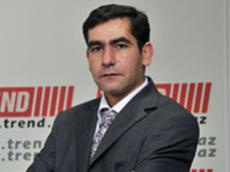|
|
TODAY.AZ / World news
Iran’s demands from the P5+1
15 January 2013 [18:35] - TODAY.AZ
 An IAEA delegation group, headed by Deputy Director General of the agency Herman Nackaerts will begin its second visit in two months to Iran on Wednesday.
An IAEA delegation group, headed by Deputy Director General of the agency Herman Nackaerts will begin its second visit in two months to Iran on Wednesday.IAEA delegation arrived in Tehran in early December 2012, but was not allowed to visit Parchin military complex where it is suspected that a nuclear-related test has been carried out.
Shortly after, Iranian top officials announced several times that if Western countries recognize Iran's rights to continue uranium enrichment, Iran would allow Parchin to be inspected.
Western countries don't reject Iran's right to have a peaceful nuclear program, their problem lies with worries about the program's probable military aspects. Iran's announced that preconditions for an inspection would be agreed upon at the end of negotiations (if not after), not at the beginning.
Iran also is demanding the elimination of all of sanctions against the country as a precondition for an inspection of Parchin. The elimination of international sanctions is a complicated legal process and needs several years time to be completely carried out (for example, Iraq's case after the collapse of Saddam Hussein). It would then take a long time if Iran waits for the removal of sanctions for constructive talks to begin.
On the other hand, none of the P5+1, nor the IAEA see a bright outlook for the resolution of Iran's nuclear dispute.
International sanctions against Iran have being been tightened and Iran's economy faces increasing problems.
However, it should be considered that Iraq's ruler Saddam Hussein didn't collapse even after unprecedented "oil for food" sanctions, which were implemented after its attack on Kuwait in 1991. Those sanctions were not removed until after Saddam's regime fell in 2003.
Iran probably would stand by its own position even as sanctions continue to tighten as much as Iraq's.
Iran recognizes Western sanctions as a tool for collapsing the Islamic regime and this view is completely believable. Western countries have not been fair with Iran yet, for instance, Iran halted uranium enrichment in 2003 for more than two years without any reward from the West.
The United State's hostility against Iran is not a new matter, its participation in a coup against Iran's first democratically elected prime minister, Mohammad Mosaddegh in 1953 because he kept Iranian oil reserves from the United Kingdom in 1950 by nationalizing them, giving asylum to Iran's last king, Mohammad Reza Pahlavi who left the country with billions dollar of gold, and refusing to return neither him, nor his stolen assets and other instances have caused Iran to distrust the US and European countries.
It seems both sides should start compromising on some vital issues to eliminate distrust. For instance, Iran could tolerate more internal opposition and provide free elections and general freedoms to improve its image. On the other hand, the U.S. can renew the Iranian airline fleet, or provide Iran with modern industrial technology. Iran can accept the NPT's Additional Protocol and the U.S. can help Iran produce radio-medicals. The Western country could remove some sanctions against Iran step-by-step and Iran could help them eliminate extremist Islamic terror groups in the Middle East and Afghanistan.
Iran can continue its nuclear program in the face of full and isolating sanctions for decades like what Saddam Hussein or North Korea did. The sanctions affect the Iranian people in reality, not Iran's nuclear program.
Dalga Khatinoglu /Trend/
URL: http://www.today.az/news/regions/117730.html
 Print version
Print version
Views: 1272
Connect with us. Get latest news and updates.
See Also
- 28 February 2026 [11:05]
Pakistan says 331 Taliban fighters killed in border fighting - 28 February 2026 [10:00]
Iran agrees not to retain enriched uranium, says Oman’s Foreign Minister - 28 February 2026 [09:00]
US to use AI to find China’s weaknesses - 28 February 2026 [08:30]
Azerbaijan moves to institutionalise AI as it seeks post-oil growth - 28 February 2026 [08:00]
Instagram warn parents about suicidal signs - 27 February 2026 [23:50]
Former Airbus CEO calls Germany’s fighter jet partnership with France “strategic mistake” - 27 February 2026 [22:26]
Google and Meta strike AI chip deal - 27 February 2026 [21:22]
NASA images Sun-like star bubble in X-rays - 27 February 2026 [20:21]
Poland plans to ban social networks for under-15s - 27 February 2026 [19:41]
Clinton denies knowledge of Epstein crimes, urges Trump to testify under oath
Most Popular
 From Strasbourg to Epstein Files: How Jagland destroyed Norway's relations with Azerbaijan
From Strasbourg to Epstein Files: How Jagland destroyed Norway's relations with Azerbaijan
 SOCAR and Samsung E&A sign memorandum to boost energy cooperation
SOCAR and Samsung E&A sign memorandum to boost energy cooperation
 Pashinyan rejects calls to oust Russian military base from Armenia
Pashinyan rejects calls to oust Russian military base from Armenia
 Microsoft founder Bill Gates breaks silence on relations with Epstein
Microsoft founder Bill Gates breaks silence on relations with Epstein
 Azerbaijan’s water reservoirs have only 12 months of ‘buffer’ left, according to ADSEA
Azerbaijan’s water reservoirs have only 12 months of ‘buffer’ left, according to ADSEA
 President Erdo?an praises security forces at Ramadan iftar in Be?tepe
President Erdo?an praises security forces at Ramadan iftar in Be?tepe
 Philharmonic Hall hosts spectacular classical concert
Philharmonic Hall hosts spectacular classical concert
